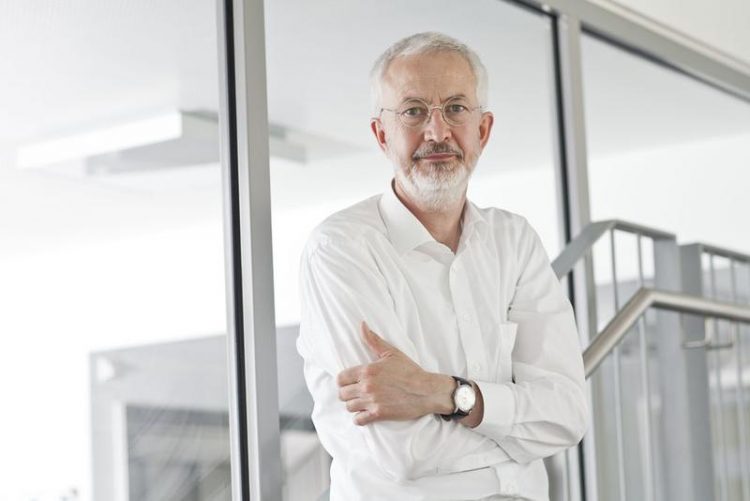Understanding signaling pathways, fighting the spread of cancer

Christoph Peters is the spokesperson for the special research area "Control of Cell Mobility in Morphogenesis, Cancer Invasion and Metastasis." Photo: Britt Schilling/University Medical Center Freiburg
The German Research Foundation (Deutsche Forschungsgemeinschaft, DFG) has approved the renewal application for the Collaborative Research Center (CRC, Sonderforschungsbereich, SFB) 850 “Control of Cell Motility in Morphogenesis, Cancer Invasion and Metastasis”. The CRC 850 has been running since January 1, 2010 and will enter its third and final funding period starting at the beginning of 2018.
The DFG has assured a total of 12.7 million euros for the coming four years. Researchers from the Faculties of Biology and Medicine at the University of Freiburg along with the German Cancer Consortium, partner site Freiburg and the Max Planck Institute of Immunobiology and Epigenetics are collaborating in this CRC, which hitherto has brought forth more than 180 scientific publications.
Prof. Dr. Christoph Peters, Director of the Institute of Molecular Medicine and Cell Research and Scientific Director of Comprehensive Cancer Center Freiburg (CCCF) is the spokesperson.
Cell motility describes the cells’ ability to move actively. Uncontrolled cell motility is one of the key characteristics of malignant tumors. It allows the tumor cells to invade neighboring tissue, spread through the body and form colonies or so-called metastases in foreign organs. These metastases pose a huge problem in cancer medicine and are responsible for the majority of cancer related deaths.
Cell motility is controlled by central signaling pathways that are active during embryonic development and may be reactivated in malignant cancer cells. They play an essential role in the formation and spread of tumors.
The aim of the SFB 850 is to better understand the molecular mechanisms of these signaling pathways and to apply this knowledge to control the motility of cells, for example, through already existing drugs. These insights may also serve as basis for the development of new therapeutic strategies for inhibiting the invasion of cancer cells into healthy tissue and thereby to prevent the formation and growth of metastases.
The scientific background of the participating groups is wide ranging – from basic research in developmental biology to clinical cancer research in the CCCF, enabling a direct review of the clinical relevance of the obtained findings.
Further information
http://www.sfb850.uni-freiburg.de/en
Contact:
Prof. Dr. Christoph Peters
Institute of Molecular Medicine and Cell Research
University of Freiburg
Tel.: 0761/203-9601
E-Mail: christoph.peters@mol-med.uni-freiburg.de
Source:
Christoph Peters is the spokesperson for the special research area “Control of Cell Mobility in Morphogenesis, Cancer Invasion and Metastasis.” Photo: Britt Schilling/University Medical Center Freiburg
https://www.pr.uni-freiburg.de/pm-en/2017/understanding-signaling-pathways-fight…
Media Contact
All latest news from the category: Life Sciences and Chemistry
Articles and reports from the Life Sciences and chemistry area deal with applied and basic research into modern biology, chemistry and human medicine.
Valuable information can be found on a range of life sciences fields including bacteriology, biochemistry, bionics, bioinformatics, biophysics, biotechnology, genetics, geobotany, human biology, marine biology, microbiology, molecular biology, cellular biology, zoology, bioinorganic chemistry, microchemistry and environmental chemistry.
Newest articles

A universal framework for spatial biology
SpatialData is a freely accessible tool to unify and integrate data from different omics technologies accounting for spatial information, which can provide holistic insights into health and disease. Biological processes…

How complex biological processes arise
A $20 million grant from the U.S. National Science Foundation (NSF) will support the establishment and operation of the National Synthesis Center for Emergence in the Molecular and Cellular Sciences (NCEMS) at…

Airborne single-photon lidar system achieves high-resolution 3D imaging
Compact, low-power system opens doors for photon-efficient drone and satellite-based environmental monitoring and mapping. Researchers have developed a compact and lightweight single-photon airborne lidar system that can acquire high-resolution 3D…





















